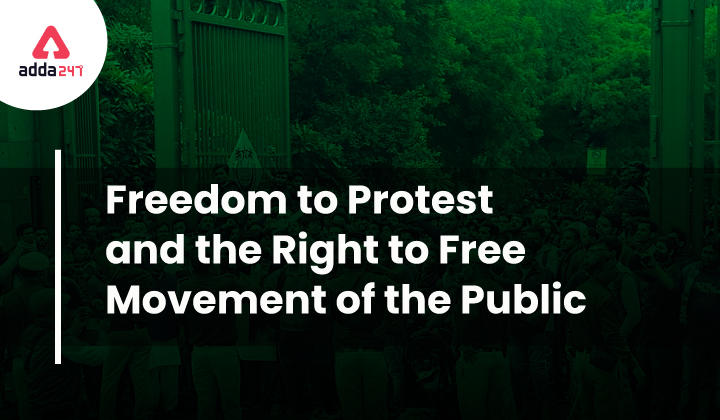GS Paper – 2: Fundamental Rights, Judgements & Cases, Centre-State Relations, Judiciary, Issues Related to Women
Context:
In a recent observation, the Supreme Court has said a solution has to be found on ongoing farmer’s protest, that roads cannot be blocked for long and there is no reason for it to lay down the law again and again.
Background:
The Apex court’s last year’s judgment on the Shaheen Bagh protest is very clear on freedom of protest and the Right to Free Public movement, wherein it was held that public ways and public spaces cannot be blocked indefinitely even during a peaceful protest.
Court’s Recent observation:
- The Supreme Court has emphasised that public roads cannot be blocked indefinitely by protesters.
- The observation can be seen either as a disapproval of the tactic of holding interminable protests or as an implicit criticism of the Government for being unable to find a solution to the farmers’ grievances.
 Farmer body’s Stand:
Farmer body’s Stand:
- Continuously denying that they are responsible for the hardship faced by the public.
- Blaming the police and Government for the blockade.
- Seeking permission to continue their agitation at the Ramlila Maidan.
Government’s Stand:
- The Government is in no mood to permit for Ramlila Maidan while recalling the unsavoury incidents that took place on Republic Day when the protest rolled into the Capital.
The conflict between the two competing rights:
- The conflict between the two competing rights — freedom to protest and the right to free movement of the public — is a very important aspect that requires immediate attention.
- So far there seems to be no attempt to break the deadlock on the core issue, with the farmers demanding an outright repeal of the laws and statutory validation for the claim that the MSP regime will not come to an end.
Apex Court’s Rulings on Right to Protest:
- The right to peaceful protest is the lifeblood of democracy.
- Many international treaties contain clear articulation of the right to protest, to safeguard the interest of human rights
- Article 19(1)(a) of the Indian constitution “Freedom of speech and expression” is a fundamental right given to its citizen against the state, which includes carrying out peaceful public demonstrations.
- In the case of Bijou Emmanuel v. the State of Kerala, (1986)3 SCC 615, “on appeal Supreme court held that there was no law under which their fundamental rights under Article 19(1)(a) could be curtailed.
- In Romesh Thappar v. State of Madras (AIR 1950 SC 124), the court held that until it’s not hampering the security of the state, it would be unconstitutional to restrain an individual from its rights under Article 19(1)(a).
Apex Court’s Rulings on Convenience of the People:
- Right to protest v. Convenience of the Public, On October 7, 2020, Supreme Court held that ‘it is important to concede the democratic polity comes with the right to protest and express dissent. However, public places cannot be occupied for an indefinite period of time.’
- Calcutta High Court on 12th January 2021 observed that “a balance has to be struck between the rights of petitioners and public order as well as security, in view of the stipulations in Article 19 of the Constitution of India itself.
Conclusion:
A fight for rights should always go ahead keeping national interest in mind without abusing others rights, without damaging public property and without shattering others emotions, life and standing for truth whether it’s in your favour or not.



 TSPSC Group 1 Question Paper 2024, Downl...
TSPSC Group 1 Question Paper 2024, Downl...
 TSPSC Group 1 Answer key 2024 Out, Downl...
TSPSC Group 1 Answer key 2024 Out, Downl...
 UPSC Prelims 2024 Question Paper, Downlo...
UPSC Prelims 2024 Question Paper, Downlo...
